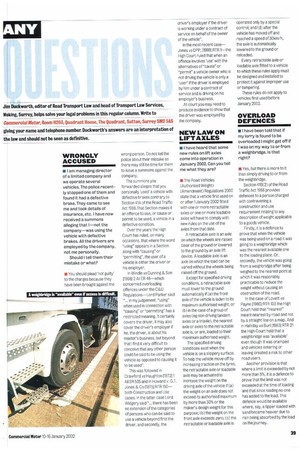WRONGLY ACCUSED
Page 39

If you've noticed an error in this article please click here to report it so we can fix it.
• I am managing director of a limited company and we operate several vehicles. The police recently stopped one of them and found it had a defective brake. They came to see me and took details of insurance, etc. I have now received a summons alleging that l—not the company—was using the vehicle with defective brakes. All the drivers are employed by the company, not me personally.
Should I tell them their mistake or what? wrong person. Do not tell the police about their mistake as there may still be time for them to issue a summons against the company.
The summons you forwarded alleges that you personally 'used a vehicle with defective brakes contrary to Section 41A of the Road Traffic Act 1988.That Section makes it an offence to use, or cause or permit to be used, a vehicle in a defective condition.
Over the years the High Court has ruled, on many occasions, that where the word "using" appears in a Section along with "causing" or "permitting", the user of a vehicle is either the driver or his employer.
In Windle vs Dunning & Son [1968] 2 All ER 46—which concerned overloading offences under the C&U Regulations—Lord Parker said "... in myjudgement, "using" when used in connection with "causing" or "permitting" has a restricted meaning. It certainly covers the driver, it may also cover the driver's employer if he, the driver, is about his master's business, but beyond that I find it very difficult to conceive that any other person could be said to be using the vehicle as opposed to causing it to be used".
This was followed in Crawford vs Haughton [1972]1 All ER 535 and in Howard v. G.T. Jones & Co [1975] RTR 150— both Construction and Use cases. In the latter case Lord Widgery said ".„ there has been no extension of the categories of persons who can be said to use a vehicle beyond first the driver, and secondly, the driver's employer if the driver is working under a contract of service on behalf of the owner of the vehicle".
In the most recent case— Jones vsDPP, [1999] RTR 1—the High Court ruled that when an offence involves 'use' with the alternatives of "cause" or "permit" a vehicle owner who is not driving the vehicle is only a 'user' if the driver is employed by him under a contract of service and is driving on his employer's business.
At court you may need to produce evidence to show that the driver was employed by the company.
















































































































































